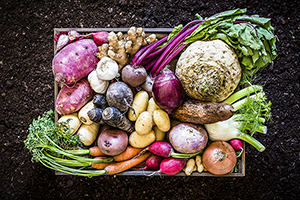



| By Dr. Ronald Hoffman
Picking up on last week’s newsletter theme (“Sorry vegans, but humans were designed to eat (some) meat”), here are some reflections based on the anthropology research I’ve been “boning up” on over the past couple of weeks.
Raw foods enthusiasts point to the health benefits of a diet consisting of fresh, uncooked vegetables, fruits, juices, raw nuts and seeds, sprouts, and smoothies. They sometimes cite evolutionary evidence that our distant primate ancestors subsisted on fresh plant foods.
 Raw foods advocates also highlight the advantages of “live enzymes” and vitamins undamaged by heat or processing. There’s certainly no dearth of fiber, which is deficient in the diets of most Westerners, in a raw foods diet. Moreover, the alkalinizing effects of the diet are considered a plus. And if the plant foods are cleanly sourced, they are relatively free of the pollutants that are embedded in the fats and protein of conventionally-raised animal products.
Raw foods advocates also highlight the advantages of “live enzymes” and vitamins undamaged by heat or processing. There’s certainly no dearth of fiber, which is deficient in the diets of most Westerners, in a raw foods diet. Moreover, the alkalinizing effects of the diet are considered a plus. And if the plant foods are cleanly sourced, they are relatively free of the pollutants that are embedded in the fats and protein of conventionally-raised animal products.
Additionally, because raw foods are not energy-dense, they provide mouth-feel and satiety without delivering many calories.
But carried to an extreme, raw foods dieting can have harmful consequences for humans. I’ve encountered many cases of fatigue and lassitude, brain fog, gastrointestinal bloating, multiple allergies and sensitivities, and premature osteoporosis in single-minded raw foods consumers.
In one memorable instance, a 60 year-old man came to see me after being diagnosed with profound osteoporosis. He had adhered to a raw foods vegan for the last 30 years. His diet consisted entirely of salads, raw vegetables, sprouts, raw nuts and seeds, and fruit smoothies. Upon testing, he had profound deficiencies of many key vitamins, minerals, amino acids, and essential fatty acids.
Fortunately, he was amenable to changing his diet and taking supplements. But as an afterthought, because he had a very high cholesterol and low HDL—in spite of consuming NO cholesterol or saturated fats whatsoever—I decided to send him for an EBT heart scan to measure the calcium accumulation in his arteries.
The results were astounding: He had a score of over 1400, which is associated with a very high risk of heart disease. I told him to see a cardiologist for a stress test in case the calcium was causing a critical blockage.
What then ensued still makes me feel a little queasy: I received a call from the gentleman from the hospital. After the stress test—which he failed miserably—the cardiologist decided to admit him immediately for an emergency angioplasty. I started to apologize for precipitating such a dire outcome, but the man insisted on thanking me profusely for sending him for the scan that revealed potential trouble. He was grateful for having “dodged a bullet” because he was likely to have had a heart attack eventually.
Ultimately, on a more balanced diet with avoidance of the excess fruit sugar he was imbibing with the juices and smoothies, this patient went on to improve his cardiac risk factors; with proper supplementation, he remineralized his depleted bones without the need for medication.
Why does the anthropological argument for a raw foods diet fail to pass muster? According to the latest evidence, it was precisely because proto-humans developed fire that we began the long march toward our present anatomical and cultural status. Fire enabled humans to cook food, breaking down the constituents of tough fibrous plants and unlocking the nutrients therein. It also enabled the consumption of sinewy animal proteins, which, if consumed raw, would’ve required massive jaws like those of carnivorous animals.
Moreover, fire enabled sterilization of slightly spoiled foods, like the scavenged remains of animals killed by more formidable predators like lions and hyenas; plant foods, too, could be resuscitated by cooking, even past their “expiration dates.”
The nutrients thus harnessed enabled humans to spend less time foraging and chewing. In fact, modern wild primates expend over half their time individually searching for food and eating, leaving less surplus time and energy for cooperative endeavors that characterize modern humans.
Modern man’s larger brains are high in macronutrient requirements, demanding 25% of total caloric intake, whereas monkey’s brains subsist on less than 10%. Cooking unlocked the concentrated nutrients that launched a revolution in human brain size. One theory even has it that dietary cholesterol derived from (cooked) animal protein was a prerequisite to the evolution of the human brain—whose structural composition is rich in cholesterol and Omega-3 fatty acids. The high cholesterol composition of human breast milk underscores its essentiality to brain development (see Leyla’s article below).
Cooking was also a seminal cultural activity, requiring communal participation in food preparation around a central hearth. Language and cooperation were essential to hunting, gathering, the making of tools, weapon, and utensils, and transmitting recipes. In fact, the famous anthropologist Claude Levi-Strauss made cooking synonymous with the development of culture in his landmark treatise entitled “The Raw and the Cooked.”
Paleontologists have used sophisticated analysis to arrive at the conclusion that Neanderthals—forerunners of modern homo sapiens—consumed 55% of their diet as meat. While Neanderthals are extinct, genetic analysis reveals that contemporary Europeans possess around 2-4% Neanderthal DNA (mine, according to 23andme is 3.4%, slightly above average, perhaps accounting for my sloping forehead and prominent brow-ridge!)
To the argument that cooking food “destroys nutrients,” it must be countered that, while there is some degradation of vitamins and other food constituents via heat, there is evidence that certain nutrients like the fat-soluble carotenoids lutein and lycopene are actually betterabsorbed when cooked with fat.
For example, try to envision eating a bowl full of raw collard greens. A daunting proposition. But when steamed and lightly sautéed with garlic, these tough greens yield their full nutritional benefits.
Raw foods are fine when added generously to a balanced diet. I make sure I eat a big raw salad at least once a day. And exclusive consumption of raw foods may serve a purpose as an occasional short-term detox regimen, or to a jump-start a weight loss diet. But long-term reliance on raw foods is nutritionally imbalanced, and is not in accordance with our evolutionary programming.
Though we think of declining estrogen as the hallmark of menopause, it's actually common for…

Up to 12 percent of Americans have ulcers at some point in life. Peptic ulcers…
Gallbladder disease is a modern illness. An estimated 20 million Americans have gallbladder disease. The…

This past week we were regaled with headlines like: High levels of niacin may increase…

March is National Nutrition Month and, needless to say, good nutritious food is essential to…

I recently attended the Integrative Healthcare Symposium (IHS), an annual conference held here in Manhattan. The…

Q&A with Leyla, Part 1: A Nicotine Vaccine

Our virtual voicemail is open 24/7, so there's no need to wait to submit your questions for Dr. Hoffman. Leave a message, and you may hear your question featured on the Intelligent Medicine radio program!